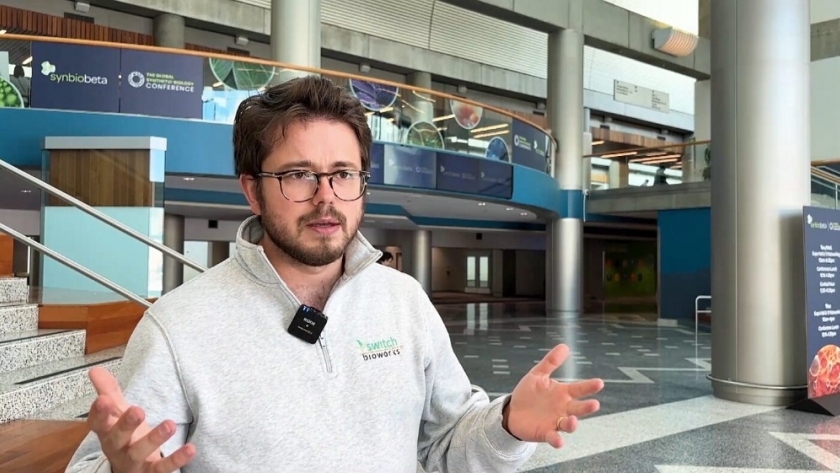
By Agroempresario.com
Switch Bioworks, a California-based biotech pioneer, is transforming agricultural fertilization by engineering microbes that optimize nitrogen production through innovative genetic switches. This breakthrough could radically reduce synthetic nitrogen fertilizer use while maintaining crop yields, marking a significant advance in sustainable agriculture.
Founded by Dr. Tim Schnabel, Switch Bioworks addresses a major challenge in microbial fertilizer technology: how to keep engineered microbes competitive in the soil before they start producing ammonia, a key nitrogen source for plants.
As Dr. Schnabel explains, when microbes are engineered to release nitrogen fertilizer, the process demands high energy. These microbes channel most of their energy into ammonia production rather than reproduction or colonization. Consequently, they lose out to native soil microbes that do not produce ammonia and are therefore more robust.
“After a few days, these engineered microbes simply disappear because native microbes are healthier and more competitive,” says Schnabel. This problem has limited the effectiveness and reliability of biological fertilizers.
Switch Bioworks’ innovation lies in genetically modifying microbes to prioritize colonization first. The microbes establish themselves in the plant’s root system before activating a built-in genetic switch that triggers ammonia production.
This approach merges the best of both worlds: highly competitive microbes that also provide vital nitrogen fertilizer to crops. “The genetic switch resides in the microbe’s DNA and detects environmental changes to turn on ammonia production at the right moment,” Schnabel explains.
Currently, Switch Bioworks is testing various genetic switches to find the optimal timing and control for fertilizer release, indicating the technology is still in development but showing promising results.
The technology platform is flexible. Switch Bioworks aims to engineer microbes that produce other beneficial compounds for crops, controlled by specific genetic switches tailored to the desired substance and environmental cues.
Rather than relying on a single microbe strain, Switch Bioworks’ initial product will include a consortium of at least three strains that occupy different root zones. This diversity enhances overall fertilizer production and adaptability.
“We could increase the number of strains to six or seven, but there is a point of diminishing returns where additional strains add more cost than benefit,” Schnabel notes. This multi-strain approach helps create resilient microbial communities capable of thriving in diverse soil types, ensuring consistent performance across different agricultural regions.
The company plans to market its product primarily as a furrow treatment but is also exploring seed coating options. Applying microbes directly to seeds before planting could improve efficiency, though challenges remain with the shelf life of dry microbial formulations.
Economically, Switch Bioworks’ product is highly scalable and cost-effective. Unlike traditional fertilizers that require large quantities, the microbial product is produced as a concentrated powder. “Our techno-economic analysis estimates production costs around $1 per acre at scale,” says Schnabel, highlighting the potential for broad adoption.
Switch Bioworks secured $17 million in initial funding in 2023, allowing significant progress in product development. Investors are attracted by the company’s unique combination of genetic engineering and precise microbial control.
Initially, Switch Bioworks is targeting the U.S. corn market, the largest consumer of nitrogen fertilizers. However, the technology has global potential, adaptable to various crops and soil conditions by selecting suitable microbes and genetic switches.
Importantly, the company collaborates with organizations like the Gates Foundation and King Philanthropies to develop solutions for Sub-Saharan Africa, where fertilizer affordability is a major barrier to food production.
“In the U.S., our product could replace up to 25% of nitrogen fertilizer. But in Africa, producing even 18 kg of nitrogen biologically could dramatically increase crop yields, potentially doubling food production,” says Schnabel, emphasizing the social impact.
Switch Bioworks was founded in 2022 and has spent the last three years developing its products in greenhouses and field trials. The company anticipates commercial availability by 2028.
Regarding the future of microbial fertilizers replacing synthetic fertilizers entirely, Schnabel is cautiously optimistic. He estimates a practical upper limit of around 50% replacement at equivalent crop yields, as going beyond would require further innovations, possibly genetic modification of the plants themselves.
However, achieving just a 25% replacement of nitrogen fertilizer with biologically produced ammonia at full yield parity would represent a revolutionary change in sustainable farming.
